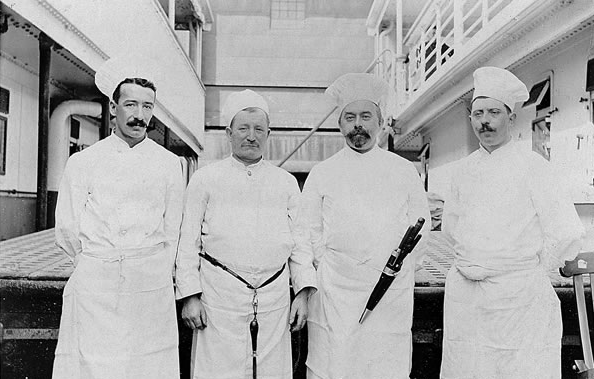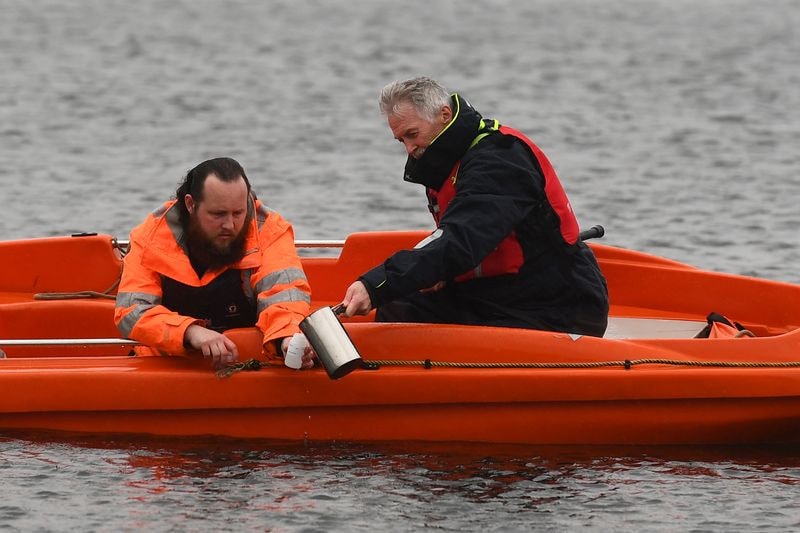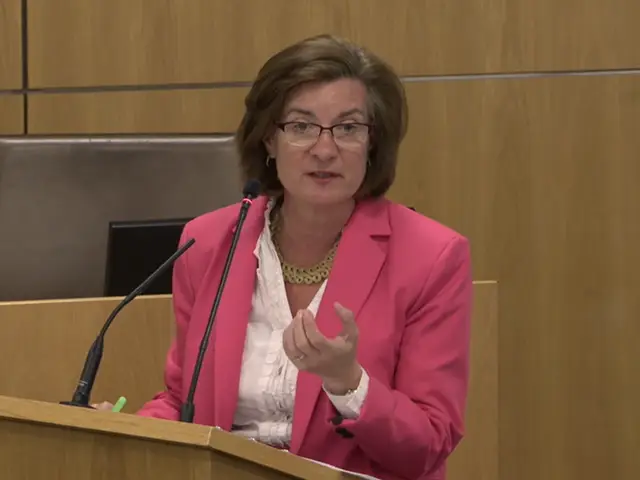News
The Pembrokeshire man on the Titanic

ON the morning of April 15 1912, in the North Atlantic some 450-miles south of Newfoundland, the RMS Titanic slowly slid beneath the sea just two hours and forty minutes after hitting an iceberg.
Stories from that night are famous, from the lookouts misplacing their binoculars to the ship’s band playing even as the sea washed over their feet, the sinking of the Titanic holds a special place in the public consciousness and continues to grab our attention some 109 years after the ‘unsinkable’ ship sank.
Over 1500 people lost their lives in the biggest maritime naval disaster at that point.
Among the dead were American and British millionaires, White Star Line employees and countless anonymous immigrants from across Europe who were all seeking a better life in America.
908 crew were on board the Titanic when it left Southampton on its fateful maiden voyage, one of the crew was a man called Charles Essex Edwards, 38, who sometimes gave himself the first name of ‘Clement’.
Charles was born in 1862 to John and Harriet Edwards of St. Martin’s Place, Haverfordwest.
He worked as a carpenter as a 19-year-old man and would end up moving out of Pembrokeshire and going to sea. By the time he married a lady called Lavinia Ann Poulter, from Llanstadwell, in May 1892 he was living in Newport.
Lavinia, a Pembrokeshire woman herself, was the daughter of Thomas and Elizabeth Poulter who lived on Lawrenny Terrace in Neyland.
By 1895, Lavinia had returned to Pembrokeshire following the death of her mother. Charles and Lavinia’s marriage suffered but Charles would continue visiting Lavinia and stayed at his father-in-law’s house when he was on shore leave.
Although still married in the eyes of the law, Charles and Lavinia were basically separated by 1901.
Charles signed on to work on the brand new RMS Titanic after it had completed its sea trials in Belfast Lough, he gave his address as 7 Brunswick Square, Southampton. He worked on the Titanic as an assistant pantry-man steward who earned a monthly wage of £3 15s on his previous ship the SS Zeeland.

When RMS Titanic left Southampton a massive crowd had gathered to see the newest addition to the White Star Line fleet depart. Charles Edwards was there. He was there when the ship picked up more passengers at Cherbourg and Cobh.
He would’ve been working during the day, his job entailed keeping the ship’s pantries stocked with food and wine, a vital job on a ship with such a high-class passenger list as the Titanic.
He was, more than likely, sleeping when Frederick Fleet spotted an iceberg in the ship’s path at 11:40pm on Sunday, April 14. He would’ve been woken by the noise of metal on ice and the ship shuddering as it was torn open on the starboard side.
As the ‘unsinkable’ ship took on water Charles, as a White Star Line employee, would’ve been given the unenviable task of waking up passengers, informing them of what happened and getting them to put on their lifejackets.
Once the scale of the situation on the Titanic became apparent, the command structure effectively disintegrated.
Captain Edward Smith would’ve cut a forlorn figure as he wandered around near the wheelhouse and his last words to his crew, according to reports at the time were:
“Well boys, you’ve done your duty and done it well. I ask no more of you. I release you.
“You know the rule of the sea. It’s every man for himself now, and God bless you.”
This would’ve been around 2:10am, at that point Charles would’ve faced a literal up-hill battle with male members of the crew only having a 24% chance of survival and many people gathering ‘like bees’ on the stern of the stricken liner which, experts say, raised to a 12 degree angle.

Many male crew members elected to stay at their posts as, according to Victorian culture it was better for men to die than to live and be perceived a coward, so the lights of the ship remained on until about 2:18am, just two minutes before Titanic broke apart and began its journey to its final resting place some 12,000ft below on the bottom of the Atlantic Ocean.
But now you know there was a man named Charles Edwards who was born in Haverfordwest and who died when the Titanic sank in the freezing waters of the North Atlantic. His body, if it was recovered, was never identified and we don’t even have a picture of him.
When news of the disaster broke, The Pembroke County Guardian described the tragedy as ‘one of the most appalling calamities in the long history of shipwreck’.
Four men from Maenclochog, it was later revealed, had a lucky escape as their plans to emigrate that April on the Titanic were thwarted by one of their number being unable to travel, so the group decided to wait for their friend. That decision saved their lives.
Pembrokeshire responded to the sinking by raising money for the Titanic Relief Fund, Pembroke Dock raised £12 2s 0d through a collection at the Royal Dockyard and, in Haverfordwest, Sidney White, who would later go on to own The Palace Cinema, hosted benefit performances to packed houses which raised £5 15s.
Lavinia, after a legal battle with Charles’ brother William, was given £192 in compensation for Charles’ death and went on to look after her father at Railway Terrace, Neyland until he passed away.
Lavinia went on to move to Middlesex where she lived until 1934. She left her estate to her chauffeur.
international news
Mandelson quits Lords amid police probe over Epstein links

Peter Mandelson has announced he will retire from the House of Lords with immediate effect, as mounting political and legal pressure grows over claims he shared sensitive government information with convicted sex offender Jeffrey Epstein.
Parliamentary officials confirmed that Peter Mandelson formally notified the Clerk of the Parliaments of his decision, ending his membership of the upper chamber from Tuesday (Feb 4).
The move follows reports that the Metropolitan Police Service is reviewing allegations of possible misconduct in public office connected to emails said to have been forwarded to Epstein while Mandelson was business secretary during the 2008–09 financial crisis.
Downing Street has confirmed that material has been passed to police after an initial Cabinet Office review.
Government fury

Prime Minister Keir Starmer told cabinet colleagues Mandelson had “let his country down”, according to No 10, and officials are now drafting legislation that could strip him of his peerage entirely.


Removing a life peer is rare and would require an Act of Parliament.
If passed, Mandelson would lose the title “Lord” altogether — an extraordinary step that has only been considered in the most serious cases.
Senior ministers have described the alleged passing-on of market-sensitive government discussions as “disgraceful” and a “betrayal of trust”.
What police are examining
Misconduct in public office is a centuries-old common law offence that applies where someone in a position of public trust wilfully abuses that role. It carries a maximum sentence of life imprisonment.
Investigators will assess whether confidential information — particularly relating to government financial policy during the crash — was shared without justification and whether safeguards were breached.
At this stage, no charges have been brought.
Mandelson has previously apologised for maintaining contact with Epstein after the financier’s conviction, saying he regrets “ever having known him”, but he has disputed some of the latest claims and has not commented directly on the police review.
Political shockwaves
Opposition parties are pushing for further disclosure of documents relating to Mandelson’s vetting and his past roles.
Conservatives are expected to force a Commons vote demanding more information, while Liberal Democrats have called for a public inquiry.
Several MPs have also suggested Mandelson should be removed from the Privy Council.
The developments mark a dramatic fall for one of Labour’s most influential political figures of the past three decades, who only months ago was serving as the UK’s ambassador to Washington.
Now, with police examining evidence and legislation being prepared to remove his title, his public career appears effectively over.
More updates are expected as the investigation continues.
Community
Cleddau at heart of major water reforms as ministers promise ‘fundamental reset’

New regulation plan aims to tackle pollution, sewage spills and ageing infrastructure
COMMUNITIES along the River Cleddau could see tighter controls on pollution and stronger oversight of water companies after ministers unveiled what they describe as a once-in-a-generation shake-up of how Wales’ water system is run.
The Welsh Government this week published a Green Paper promising cleaner rivers, tougher enforcement and a new Welsh economic regulator dedicated solely to the water sector.
Deputy First Minister Huw Irranca-Davies said it was time for a “fundamental reset” to rebuild public trust, warning that ageing infrastructure, climate pressures and growing concern about water quality meant the current system was no longer fit for purpose.
For Pembrokeshire residents, those words land close to home.

Local frustration growing
From Haverfordwest down to Milford Haven, the Cleddau is both a working waterway and a natural asset, supporting wildlife, leisure users, anglers and tourism businesses.
But in recent years there have been repeated complaints about sewage overflows, murky water after heavy rain and nutrient pollution washing in from across the catchment.
Storm discharges and wastewater treatment are the responsibility of Dŵr Cymru Welsh Water, while environmental enforcement sits with national regulators. Many locals say neither has acted quickly enough when problems arise.

Residents and river users have told The Herald they feel the estuary is “worse than it used to be”, particularly after periods of wet weather when combined sewer overflows can activate.
Concerns range from the impact on fish stocks and birds to whether the water is safe for paddleboarding, sailing and wild swimming.
What ministers are proposing
The consultation sets out plans to:
- create a new Welsh regulator focused on water
- strengthen monitoring and enforcement
- drive investment in ageing pipes and treatment works
- improve transparency and accountability
- support long-term environmental protection
Since 2022, the government says it has invested more than £56 million tackling water quality through enforcement, monitoring and nature-based solutions. A further £5 million has been earmarked next year specifically for river and coastal improvements.
Ministers say the changes should make it easier to fine or sanction poor performance and force faster upgrades where infrastructure is failing.

Why the Cleddau matters
The Cleddau catchment is one of west Wales’ most important waterways.
It feeds into the Milford Haven Waterway, a key centre for industry, energy, fishing and recreation, while also providing habitat for protected wildlife and drawing thousands of visitors each year.
Any decline in water quality has knock-on effects not just for nature but for jobs and the local economy.
Campaigners argue that without tougher oversight and sustained investment, the river risks long-term damage.
Consultation open
The Green Paper is now out for public consultation, with ministers inviting views from residents, businesses and community groups.
For many in Pembrokeshire, this may be a rare chance to push for specific improvements on their doorstep — from fewer sewage discharges to better monitoring of agricultural runoff and clearer reporting when incidents occur.
If the promised “reset” is to mean anything locally, it will be judged on one thing: whether the Cleddau actually gets cleaner.
The consultation is open on the Welsh Government website, and submissions can be made by individuals as well as organisations.
News
Davies and Morgan clash over policing powers and terror response in Senedd exchange

CONSERVATIVE MS says breaking up UK would ‘benefit criminals’ as First Minister insists Wales would still rely on cross-border co-operation
A ROW over whether policing powers should be devolved to Wales spilled onto the Senedd floor as a senior Conservative warned that separating from UK-wide structures could leave the country exposed to terrorism and serious crime.

During questions to the First Minister in Senedd Cymru, Andrew RT Davies pressed ministers on whether law and order is better delivered from Westminster rather than Cardiff Bay.
Opening the exchange, Mr Davies said that although he and the Welsh Government disagreed on where policing powers should sit, they should both accept that dismantling the United Kingdom would weaken security.
He told the chamber that if “separatists had their way and they broke up the United Kingdom, policing would be fundamentally weakened in these islands and the criminals will benefit from it”.
He asked the First Minister to agree that the UK provides the strongest framework for keeping communities safe through joint working between England, Wales, Scotland and Northern Ireland.
“The co-operative working and that strong union, working together… protects the citizens of this great country of ours,” he said, urging ministers to reject what he called a “narrow, separatist, independent argument”.

‘Strong devolution in a strong UK’
Responding, Eluned Morgan said her government was not pursuing devolution as a stepping stone to independence.
“We want to see strong devolution in a strong UK,” she said, adding that Labour remained committed to improving services rather than chasing constitutional change for its own sake.
She argued that reforming how policing is governed in Wales could improve accountability and outcomes for the public, particularly as discussions continue over replacing the current police and crime commissioner model.
“We want to see change when it comes to policing… because we want to see better provision for the people in Wales,” she told MSs.
Terrorism expertise ‘not something you could replicate’
However, the First Minister acknowledged that certain specialist capabilities, particularly counter-terrorism, would still require close links with the rest of the UK.
“It of course makes sense for us to co-operate across the border when it comes to policing, when it makes sense,” she said.
“Just think about terrorism; we’ll never have the kind of absolute expertise in terrorism that you may get in a place like London. We would have to work with them and depend on them—not something you could do in an independent Wales.”
Her comments prompted Mr Davies to argue that this reliance showed why policing should remain reserved to Westminster.
He later said the admission demonstrated “the dangers of putting the Senedd in charge of policing”, claiming Wales could end up dependent on external support during major incidents.
Long-running debate

Policing and criminal justice are among the few major public services not currently devolved to Wales, with responsibility resting with the UK Government.
Supporters of devolution, including Plaid Cymru, argue that Welsh control would allow policies better tailored to local needs.
Opponents say fragmenting the system could weaken intelligence sharing and increase costs, particularly for specialist units tackling organised crime and terrorism.
The exchange underlines how the issue remains a political dividing line in Cardiff Bay, with both sides framing the argument around public safety rather than constitutional theory.
For now, any change would require agreement from Westminster, meaning the debate is likely to continue long before any powers formally shift.
-

 Health5 days ago
Health5 days agoConsultation reveals lack of public trust in health board
-

 News6 days ago
News6 days agoCaldey still unsafe, survivors warn — despite Abbey’s reform claims
-

 Community6 days ago
Community6 days agoPembrokeshire students speak at national Holocaust Memorial Day event
-

 News4 hours ago
News4 hours agoPrincess of Wales visits historic Pembrokeshire woollen mill
-

 News6 days ago
News6 days agoKurtz raises Gumfreston flooding in the Senedd as petition deadline nears
-

 Community5 days ago
Community5 days agoCampaign to ‘save’ River Cleddau hits over 2,200 signatures
-

 Crime4 days ago
Crime4 days agoPembroke man accused of child sex offences sent to Swansea Crown Court
-

 Education6 days ago
Education6 days ago‘Vulnerable teen’ questioned by police at Milford Haven School




























